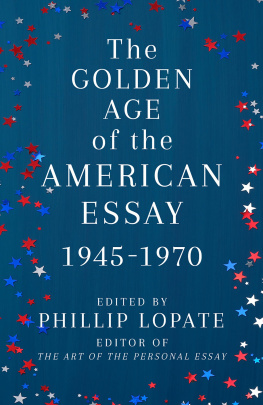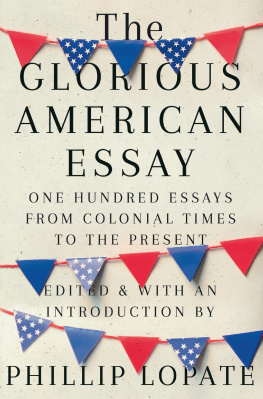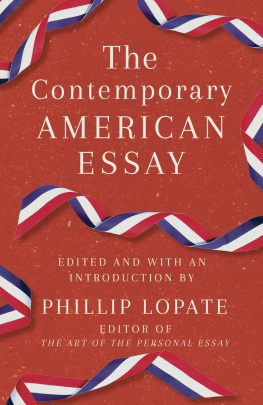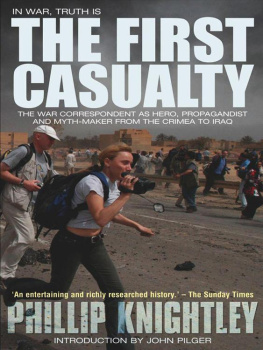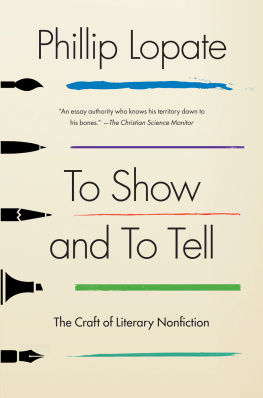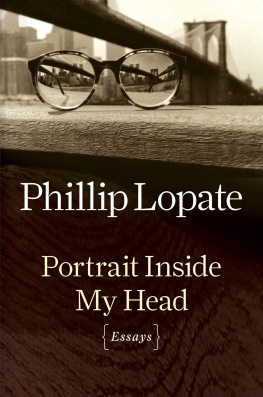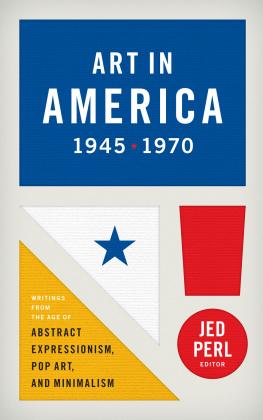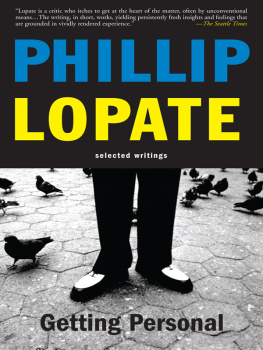Phillip Lopate - The Golden Age of the American Essay: 1945-1970
Here you can read online Phillip Lopate - The Golden Age of the American Essay: 1945-1970 full text of the book (entire story) in english for free. Download pdf and epub, get meaning, cover and reviews about this ebook. year: 2021, publisher: Knopf Doubleday Publishing Group, genre: Politics. Description of the work, (preface) as well as reviews are available. Best literature library LitArk.com created for fans of good reading and offers a wide selection of genres:
Romance novel
Science fiction
Adventure
Detective
Science
History
Home and family
Prose
Art
Politics
Computer
Non-fiction
Religion
Business
Children
Humor
Choose a favorite category and find really read worthwhile books. Enjoy immersion in the world of imagination, feel the emotions of the characters or learn something new for yourself, make an fascinating discovery.
- Book:The Golden Age of the American Essay: 1945-1970
- Author:
- Publisher:Knopf Doubleday Publishing Group
- Genre:
- Year:2021
- Rating:4 / 5
- Favourites:Add to favourites
- Your mark:
- 80
- 1
- 2
- 3
- 4
- 5
The Golden Age of the American Essay: 1945-1970: summary, description and annotation
We offer to read an annotation, description, summary or preface (depends on what the author of the book "The Golden Age of the American Essay: 1945-1970" wrote himself). If you haven't found the necessary information about the book — write in the comments, we will try to find it.
The Golden Age of the American Essay: 1945-1970 — read online for free the complete book (whole text) full work
Below is the text of the book, divided by pages. System saving the place of the last page read, allows you to conveniently read the book "The Golden Age of the American Essay: 1945-1970" online for free, without having to search again every time where you left off. Put a bookmark, and you can go to the page where you finished reading at any time.
Font size:
Interval:
Bookmark:
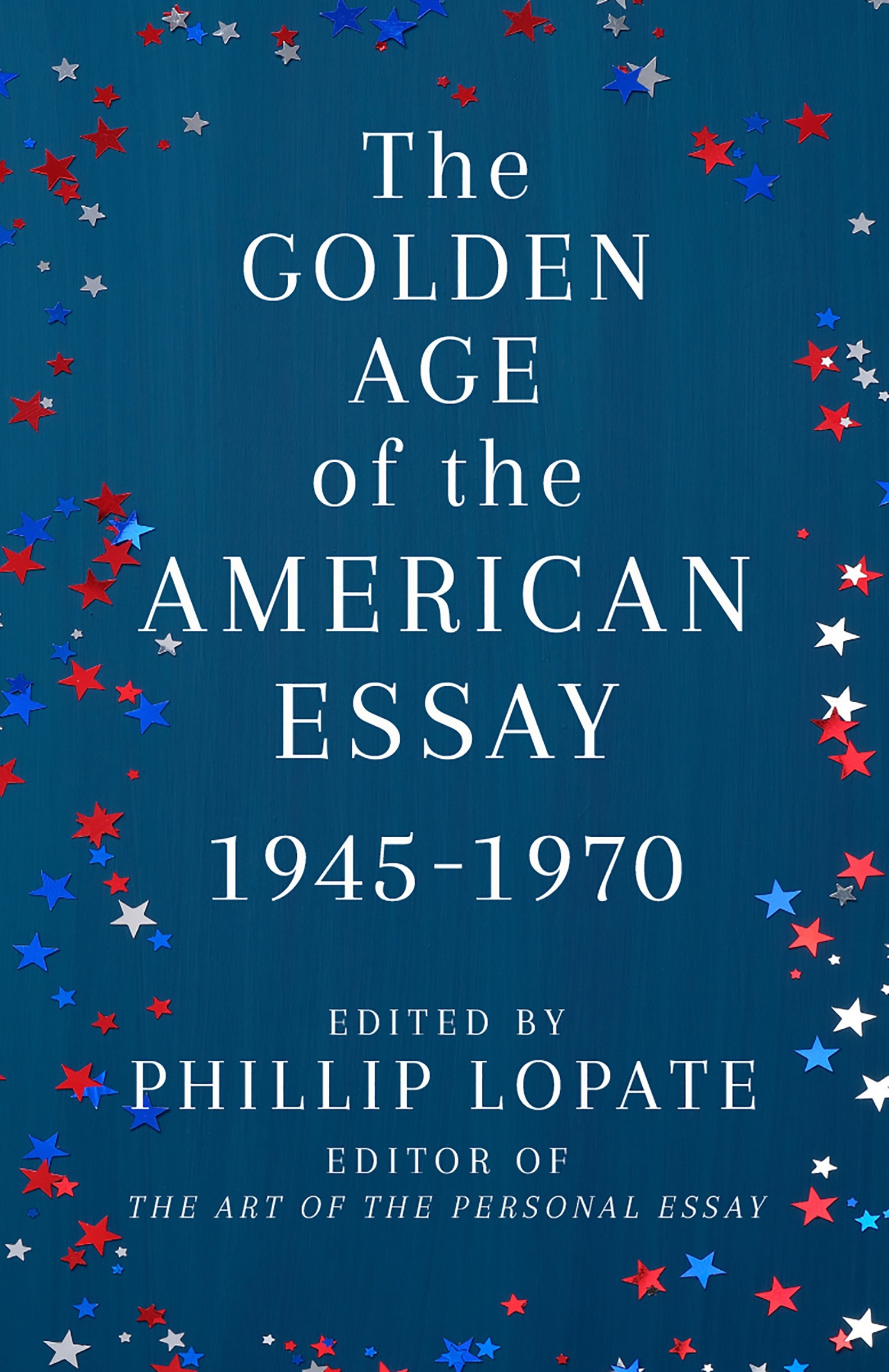
Phillip Lopate is the author of To Show and to Tell: The Craft of Literary Nonfiction and four essay collections: Bachelorhood, Against Joie de Vivre, Portrait of My Body, and Portrait Inside My Head. He is the editor of the anthologies The Glorious American Essay, The Art of the Personal Essay, Writing New York, and American Movie Critics. He was awarded a John Simon Guggenheim Fellowship, a Cullman Center Fellowship, two National Endowment for the Arts grants, and two New York Foundation for the Arts grants. He is a professor of writing at Columbia Universitys nonfiction MFA program and lives in Brooklyn, New York.
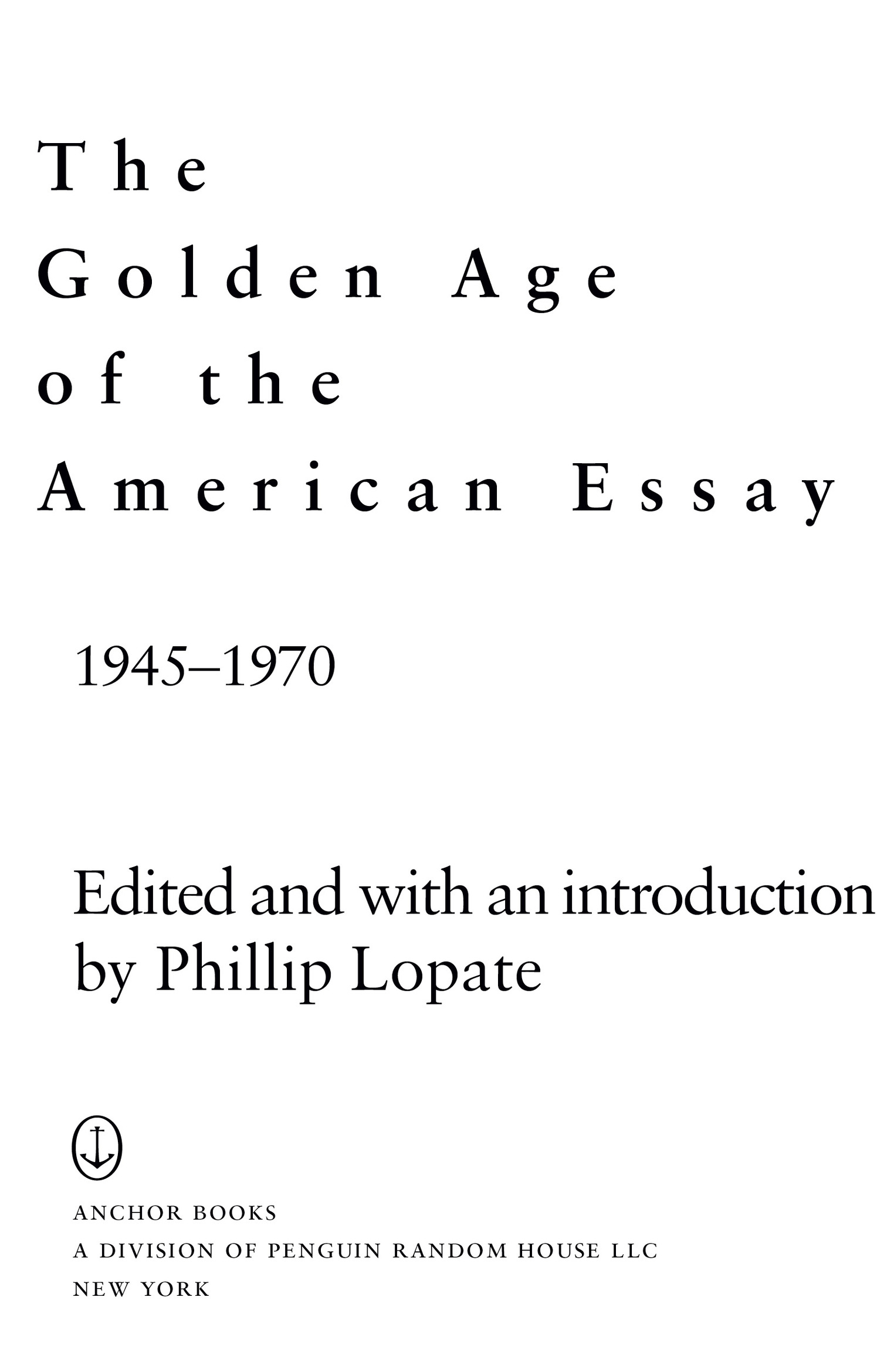
AN ANCHOR BOOKS ORIGINAL, APRIL 2021
Introduction, headnotes, and compilation copyright 2021 by Phillip Lopate
All rights reserved. Published in the United States by Anchor Books, a division of Penguin Random House LLC, New York, and distributed in Canada by Penguin Random House Canada Limited, Toronto.
Anchor Books and colophon are registered trademarks of Penguin Random House LLC.
constitutes an extension of this copyright page.
The Cataloging-in-Publication Data is on file at the Library of Congress.
Anchor Books Trade Paperback ISBN9780525567332
Ebook ISBN9780593312810
Cover design by Sarahmay Wilkinson
Cover photograph photoguns/iStock/Getty Images
www.anchorbooks.com
ep_prh_5.7.0_c0_r0
There are certain historical periods when the essay suddenly comes to the fore, and is popular and talked about and relevant, before sinking back into a more typical commercially wan state. The twenty-five years that followed the end of World War II (19451970) were an exceptionally fertile period for American essays. One would have to go back to the mid-nineteenth-century American Renaissance of Emerson, Thoreau, Melville, and Margaret Fuller to find a comparable flowering.
Just to give some idea of the range and talent of the essayists in that era: there were masters of the form such as James Baldwin, E. B. White, Elizabeth Hardwick, Susan Sontag, and Edmund Wilson; critics in literature, film, painting, and dance such as Lionel Trilling, Leslie Fiedler, Robert Warshow, Clement Greenberg, Harold Rosenberg, Edwin Denby, James Agee, Manny Farber, Parker Tyler, Pauline Kael, and Irving Howe; policy pundits and diplomats such as Walter Lippmann and George F. Kennan; theologians on the order of Paul Tillich and Reinhold Niebuhr; novelists who moonlighted as essayists, including Norman Mailer, Mary McCarthy, Ralph Ellison, Saul Bellow, Philip Roth, John Updike, Flannery OConnor, and Gore Vidal; poet-essayists like Randall Jarrell; social scientists and historians, including Robert K. Merton, Margaret Mead, Erving Goffman, Richard Hofstadter, and David Riesman; nature and science writers like Loren Eiseley, Rachel Carson, Edward Hoagland, Annie Dillard, and Lewis Thomas; the food writers M. F. K. Fisher and A. J. Liebling; and New Journalists Joan Didion, Tom Wolfe, Gay Talese, and Seymour Krim.
Why should this proliferation of the essay have occurred at this particular moment? One could offer several explanations. At wars end, the United States was positioned as the dominant world power, which gave its writers a responsibility to reflect and criticize, with the vanity or expectation that the world would listen. The presence of European migr thinkers who had fled fascism, such as Hannah Arendt, Theodor Adorno, Nicola Chiaromonte, and Thomas Mann, had raised the intellectual bar and invited a more cosmopolitan perspective, and a wish to emulate that sophisticated continental discourse. The figure of the public intellectual, who would be expected to transmit and explain complex ideas, was in ascension. The general public was willing to take instruction from learned commentators without bristling; for example, poets John Ciardi and Kenneth Rexroth introduced their readers to masterpieces of world literature in their periodical columns. In tandem was the proliferation of weeklies, little magazines, and quarterlies that welcomed such voices, such as Partisan Review, Commentary, TheParis Review, Saturday Review, The New York Review of Books, The New Leader, TheHudson Review, TheVillage Voice, and The New Yorker. Even established mass-market journals like Esquire, Harpers, Vogue, and Playboy, not to mention newspapers, all romanced the essay for a while. The astounding growth of American universities and colleges in the postwar era nourished academic disciplines and provided freelance writers and scholars with a living, with the proviso that they publish or perish.
Meanwhile, the tensions that rippled through the postwar era and beyond cried out for interpretation and commentary. There was the Cold War with the Soviet Union and its side effect, McCarthyism, which elicited heated debate when it did not provoke silence and fear; the armed conflicts in Korea and Vietnam, and the nuclear threat hovering over everyone; the enduring problems of racism, sexism, poverty, and ecological degradation; the clash between puritanical family values and sexual freedomall of which spawned the civil rights movement, womens liberation, and the environmental, gay rights, and antiwar movements, and their attendant essayistic formulations.
But lets go back to the start of the postwar era and try to disentangle these strands. The jubilation that followed the defeat of the Axis powers was widespread. As Anatole Broyard described it in Kafka Was the Rage: Nineteen forty-six was a good timeperhaps the best timein the twentieth century. The war was over, the Depression had ended, and everyone was rediscovering the simple pleasures. A war is like an illness and when its over you think youve never felt so well. Theres a terrific sense of coming back, of repossessing your life. There was also newfound pride in the nations position: the twentieth century was dubbed the American Century and New York City, home to the newly established United Nations, referred to as the capital of the world.
Its odd, in retrospect, to consider how short-lived that era of good feeling was. It fell swiftly to anxiety. By 1948 the threat of an expansionist Soviet Union had given rise to the House Un-American Activities Committee hearings, intended to ferret out Communists or fellow travelers in the Hollywood community, and Senator Joseph McCarthys probes of alleged spies in the federal government soon followed. The Republican Party, which had been locked out of power during Franklin Roosevelt and Harry Trumans combined five terms of office, saw anti-Communism as both a patriotic issue and an opportunity to begin to roll back the New Deals social programs. The anti-Stalinist Left was torn between acknowledging the Soviet Unions threat and deploring wholesale attacks on radicals speech.
Some of the anxiety and malaise that took hold of the country can be seen as a hangover from the tragedies surrounding World War II. Norman Mailer put it this way in his 1957 essay The White Negro: Probably, we will never be able to determine the psychic havoc of the concentration camp and the atomic bomb upon the unconscious mind of almost everyone in those years.The Second World War presented a mirror to the human condition which blinded everyone who looked into it. For if tens of millions were killed in concentration campsif society was so murderous, then who could ignore the most hideous of questions about his own nature? Worse. One could hardly maintain the courage to be individual, to speak with ones own voice, for the years in which one could complacently accept oneself as part of an elite by being a radical were forever gone. A man knew that when he dissented, he gave a note upon his life which could be called in any year of overt crisis. No wonder then that these have been years of conformity and depression. A stench of fear has come out of every pore of American life, and we suffer from a collective failure of nerve.
Font size:
Interval:
Bookmark:
Similar books «The Golden Age of the American Essay: 1945-1970»
Look at similar books to The Golden Age of the American Essay: 1945-1970. We have selected literature similar in name and meaning in the hope of providing readers with more options to find new, interesting, not yet read works.
Discussion, reviews of the book The Golden Age of the American Essay: 1945-1970 and just readers' own opinions. Leave your comments, write what you think about the work, its meaning or the main characters. Specify what exactly you liked and what you didn't like, and why you think so.

